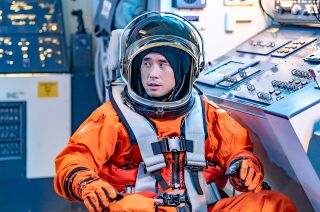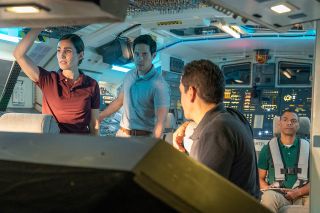'Quantum Leap' jumps into space shuttle history in 'Atlantis' on NBC
Space shuttle-themed episode airs tonight (Sept. 26) at 10 p.m. EDT/PDT on NBC and streams the next day on Peacock.

Something in space shuttle history needs changing.
Or so that seems to be case in the second episode of "Quantum Leap" airing Monday (Sept. 26) on NBC. Titled "Atlantis," the episode finds physicist Ben Song (Raymond Lee) headed into orbit aboard the space shuttle Atlantis in 1998.
A continuation of the original series that ran from 1989 to 1993, the new show picks up 30 years after Dr. Sam Beckett (Scott Bakula) stepped into the Quantum Leap accelerator and vanished. Now, a new team, led by Song and assisted by Addison Augustine (Caitlin Bassett), who appears in the form of a hologram that only Song can see and hear, leaps through history from life to life, putting right what once went wrong.
- Want to Watch Quantum Leap on Peacock Premium? Get the 1st 12 months for $1.99/month
- Subscribe to Peacock Premium for $9.99/month
"Our whole room is super into sci-fi and super into space, and these shows are written as a group," showrunner Martin Gero told collectSPACE.com in an interview. "So everyone contributed magnificently [to this episode]."
Gero said it was not just Lee who was living vicariously through his character's turn as an astronaut.
"Just with Raymond, well, everyone dreams of being an astronaut, right? There's no one who hasn't thought about it just casually — I mean, some people obviously obsess about it more than most, and they become astronauts — but seeing the cast get to don all of the [spacesuit] equipment, it was so much fun for everyone," he said.
Related: The best sci-fi TV shows of all time
Get the Space.com Newsletter
Breaking space news, the latest updates on rocket launches, skywatching events and more!
In a video promo released by NBC, Lee and his Atlantis crewmates, played by José Zúñiga ("Commander Jim Reynolds"), Carly Pope ("Samantha Stratton") and Leith Burke ("Max Everett"), are seen wearing advanced crew escape suits (ACES), the bright orange pressure garments worn by space shuttle astronauts for launch and re-entry. Lee is also seen donning an EMU, the extravehicular mobility unit, or spacesuit, worn by crew members to perform spacewalks.
Space shuttle Atlantis, itself, is shown in the promo lifting off — using footage from the actual STS-122 mission in 2008 — and then in orbit around Earth.
"[The scenes] encapsulate the thrill and awe and majesty of the space shuttle era, and that's what we tried to do with this episode," said Gero.
Robert Yowell, a former space shuttle flight controller who served as a technical advisor for the episode, agreed.
"I was at Johnson Space Center working in Mission Control in 1998. It was an exciting time," he said. "I'm glad that this little snippet sort of captures that, from the moment of launch to the very end of the episode."

"Atlantis" marks the second time that "Quantum Leap" has crossed over with NASA history. The first space-themed episode aired as part of the original series and involved a different type of astronaut.
In "The Wrong Stuff," Sam Beckett (Bakula) leaps into "Bobo," a chimpanzee that NASA is training for a possible spaceflight on Jan. 24, 1961. The episode is loosely based on NASA's use of great apes to prove that space travel was safe for humans before launching the Mercury astronauts.
NASA launched two chimpanzees: "Ham" aboard Mercury-Redstone 2 on Jan. 31, 1961, and "Enos" on Mercury-Atlas 5 on Nov. 29, 1961.
Despite the new series being a continuation, rather than a reboot of "Quantum Leap," Gero said not to expect a nod in "Atlantis" linking the two NASA-inspired episodes.
"We did talk about that, because that's such a fun episode," he said. "But I think for us, we're trying to find a balance between having this be our own show and yet being respectful and putting in as many easter eggs as we can from the original."
Follow collectSPACE.com on Facebook and on Twitter at @collectSPACE. Copyright 2022 collectSPACE.com. All rights reserved.
Join our Space Forums to keep talking space on the latest missions, night sky and more! And if you have a news tip, correction or comment, let us know at: community@space.com.

Robert Pearlman is a space historian, journalist and the founder and editor of collectSPACE.com, an online publication and community devoted to space history with a particular focus on how and where space exploration intersects with pop culture. Pearlman is also a contributing writer for Space.com and co-author of "Space Stations: The Art, Science, and Reality of Working in Space” published by Smithsonian Books in 2018. He previously developed online content for the National Space Society and Apollo 11 moonwalker Buzz Aldrin, helped establish the space tourism company Space Adventures and currently serves on the History Committee of the American Astronautical Society, the advisory committee for The Mars Generation and leadership board of For All Moonkind. In 2009, he was inducted into the U.S. Space Camp Hall of Fame in Huntsville, Alabama. In 2021, he was honored by the American Astronautical Society with the Ordway Award for Sustained Excellence in Spaceflight History.

